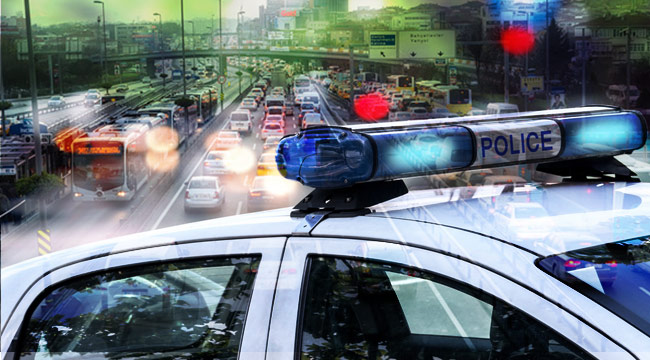
By the end of October, the state of Massachusetts will have converted its turnpike, notorious for traffic jams up and down its exits as drivers collect at tollbooths, to automated tolling, or AET. With a simple transponder scan or a license plate check, drivers will breeze through without having to stop. It sounds great, but is your speedy commute too good to be true? Yep, because it’s just been revealed that the automation might also be yet another collision between convenience and privacy on the road.
Convenience Vs. Safety
The Boston Globe recently uncovered that the automatic tolling gantries being built by the state will scan license plates and toll transponders and compare them against a “hot list” of stolen vehicles, amber alerts, and other emergency situations. That sounds good in theory, but it’s not really clear just what an “emergency situation” is — possibly because the state itself hasn’t defined it yet. It’s also not clear how long data collected for tolling purposes might be stored, although the state has made clear that while it collects speed data, they won’t be issuing speeding tickets.
Part of what’s making privacy advocates so concerned is that Massachusetts has been here before. In 2013, the Boston police department accidentally sent raw data from its license plate readers to journalists, who quickly found that police were scanning every plate they saw and failing to chase down any stolen vehicles or insurance scofflaws. The readers spotted a stolen motorcycle 59 times in five months and it was never even pulled over. What does that mean? Well, aside from the fact that the person whose motorcycle was stole had insult added to their injury — there’s nothing worse than knowing someone’s out there with a piece of property they took from you — it means privacy was sacrificed for nothing. If the police aren’t going to do anything useful with the data, why do they really need it in the first place?
And not helping matters is that it’s not clear if license plate readers have prevented crime in the first place. Statistics are thin on the ground, and most stories involving them are not positive stories of children saved from kidnappers, but innocent people being arrested at gunpoint. Tying it to the Amber Alert system, which has been found to be ineffectual at best in independent reviews, doesn’t improve confidence.
From a national perspective, though, there’s something ever far more worrying: Your car is essentially a privacy problem on wheels in the first place, considering it has a giant, easy to read steel identification number bolted to the bumper. And the minimal amount of privacy drivers have is getting sacrificed for convenience without anyone bothering to ask their opinion.
Where Does License Plate Data Go?
License plate readers are so cheap that, in theory, a driver could be followed from the point they hit the road right down to where they end up. License plate readers are everywhere from cacti to, potentially, garbage trucks, not to mention in use by 70% of police forces in the US.
Legally speaking, the police are allowed to collect this data as long as cars are located in a publicly accessible place, like driving on a highway or parked on the street. Less clear is how long this data should be kept. Mostly that’s decided on a state by state basis, with decisions ranging from only as long as it takes to determine the data has no use to, well, forever.
Nor is this the only problem on the horizon. The US government is widely expected to begin rolling out new vehicle safety systems called V2V, where cars will network with each other to give self-driving features and safety features like automatic braking more time to react to accidents, as well as offer better safety and traffic data for drivers. Also coming are “smart” traffic lights that communicate with your car and tell you how long a signal lasts. Neither of these have tracking capability yet, but there’s the chance it could be added. This would mean that your car could be tracked with an accuracy even a GPS bug couldn’t match. In theory, your drive to work could be recreated turn for turn, stop for stop, right down to how long you waited in line at Starbucks for your coffee, all without your express consent.
Where Does Privacy Start On The Road?
It should be noted that none of these things are intentionally designed to violate driver privacy. There were nearly 33,000 traffic fatalities in the United States in 2014 alone. Many states view reducing, and potentially eliminating, traffic fatalities as one of their most pressing issues. But the fact that this is an entirely unintentional consequence, born entirely of well-meaning efforts to help people, just illustrate how tricky technology is making it to navigate privacy issues. We need to decide just how important safety and convenience is, measured against a need for privacy on the road.






